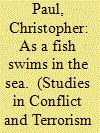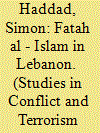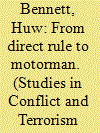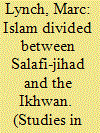|
|
|
Sort Order |
|
|
|
Items / Page
|
|
|
|
|
|
|
| Srl | Item |
| 1 |
ID:
096559


|
|
|
|
|
| Publication |
2010.
|
| Summary/Abstract |
This article reviews and synthesizes social science knowledge on the connections between popular support and terrorist/insurgent sustainment. After distinguishing between "sympathetic of" and "supporting," the author identifies support requirements of terrorists and insurgents, the range of sources of support, and motives for support. A scheme of relationships between factors contributing to strength of support is essayed. As a caveat to population-centered approaches to counterterrorism and counterinsurgency, the article concludes that support is not "one size fits all," and that certain factors, when present, are more amenable to policy influence than others. These conclusions suggest that it is imperative that practitioners of counterterrorism and counterinsurgency be mindful of the specifics of their case when seeking to undermine support.
|
|
|
|
|
|
|
|
|
|
|
|
|
|
|
|
| 2 |
ID:
096564


|
|
|
|
|
| Publication |
2010.
|
| Summary/Abstract |
The objective of this study is to provide through an in-depth investigation of the Fatah Al-Islam organization, emergence, programs, and external links, and the inner operation of this underground Salafi-jihadi group. By divulging secret confession statements to the public, it has uncovered many of the mysteries that surrounded the evolution and goals of the group. On the other hand, and more important, it has examined the application of certain conventional approaches to the study of terrorist behavior. The findings, based on the biographies of FI terrorists, seem to negate much of the advanced explanation about political violence. Economic destitution, poverty, lack of education, young age, and marital disruption for instances do not determine adherence to the group. Members of the jihadi group of FI stem from a diversified occupational background, not lacking in education, mature, married, and influenced by various motivations, specifically religious dogma.
|
|
|
|
|
|
|
|
|
|
|
|
|
|
|
|
| 3 |
ID:
096561


|
|
|
|
|
| Publication |
2010.
|
| Summary/Abstract |
The British campaign in Northern Ireland in the early 1970s is often portrayed as consistent in its repressive character and its failure to successfully relate military means to political ends. This article argues that British military strategy was adaptable, alternating between defensive and offensive means depending on the changing political context. The low profile policy allowed the army to consolidate a firm basis for later offensive operations against the Provisional Irish Republican Army (PIRA). This proved successful because it contrasted with Republican violence and was contextualized within the government's willingness to negotiate and compromise when necessary.
|
|
|
|
|
|
|
|
|
|
|
|
|
|
|
|
| 4 |
ID:
096557


|
|
|
|
|
| Publication |
2010.
|
| Summary/Abstract |
The Muslim Brotherhood poses a unique challenge to efforts to combat Al Qaeda and like-minded groups. It is one of the key sources of Islamist thought and political activism, and plays a significant role in shaping the political and cultural environment in an Islamist direction. At the same time, it opposes Al Qaeda for ideological, organizational, and political reasons and represents one of the major challenges to the salafi-jihadist movement globally. This dual nature of the Muslim Brotherhood has long posed a difficult challenge to efforts to combat violent extremism. Does its non-violent Islamism represent a solution, by capturing Islamists within a relatively moderate organization and stopping their further radicalization (a "firewall"), or is it part of the problem, a "conveyor belt" towards extremism? This article surveys the differences between the two approaches, including their views of an Islamic state, democracy, violence, and takfir, and the significant escalation of those tensions in recent years. It concludes that the MB should be allowed to wage its battles against extremist challengers, but should not be misunderstood as a liberal organization or supported in a short-term convergence of interests.
|
|
|
|
|
|
|
|
|
|
|
|
|
|
|
|
| 5 |
ID:
096562


|
|
|
|
|
| Publication |
2010.
|
| Summary/Abstract |
Several studies conducted after 9/11 found that American journalists have largely embraced the government's official frame of the "War on Terror." Drawing from the claim of an ideological bond, this study investigates how American news media covered politically violent organizations that are not linked to Al Qaeda or the events of 9/11. More specifically, the article examines whether the media's inconsistent use of the word "terror" changed as a consequence of 9/11 by comparing the coverage of these organizations before and after 9/11. A quantitative content analysis of American media indicates that overall the coverage of political violence did not change after 9/11. Moreover, journalists remained vigilant about using the word "terror" when covering politically violent organization.
|
|
|
|
|
|
|
|
|
|
|
|
|
|
|
|
|
|
|
|
|